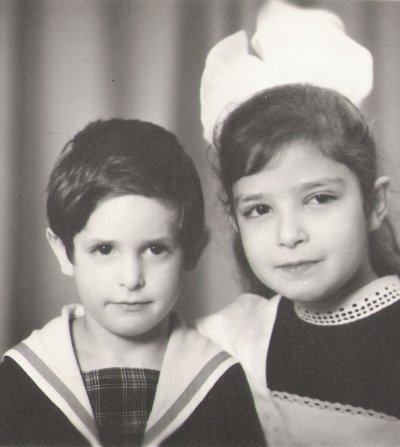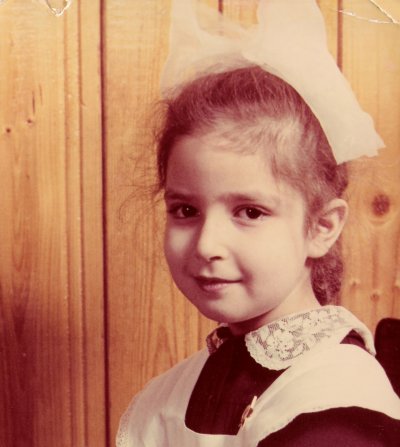As a girl in the Soviet Union, my favorite holiday was Election Day. On that day, we would go to our neighborhood school, and while we kids consumed free ice cream, adults dutifully "voted" for the sole candidate slated to become the next Soviet leader. I sensed my parents' slightly sarcastic attitude toward this event, since all adults were required to "vote," but for me, it was mostly about balloons and ice cream. It was the perfect early training in a country governed by those who clearly wanted the population to be politically apathetic.
That all began to change in 1985 when Mikhail Gorbachev became the leader of the soon-to-be-dismantled Soviet Union. Suddenly, adults started discussing politics out loud. We had to learn a new vocabulary—words like "referendum." In 1991, my parents had to participate in two of them: first, they voted whether or not to dismantle the Soviet Union, and then, whether to revert the name of the city we lived in, Leningrad, back to St. Petersburg. There was no free ice cream on referendum days, just the nervous excitement of having to make a choice.
It was confusing to see the societal structures I grew up with come tumbling down almost overnight. Before high school, Soviet kids had to be part of two youth movements: The "Little Octobrists" where 7 to 9-year-olds donned pins with a photo of baby Vladimir Lenin, and "Young Pioneers" that saw middle-schoolers adorning red scarves. At 9, I longed to finally get rid of the puffy-cheeked baby Lenin on my chest and proudly tie the red scarf of a Young Pioneer around my neck. But that year, our teachers, who had been preparing us for this rite of passage for years, confusingly told us that becoming a Young Pioneer was optional, that we should take our time and discuss it with our parents before deciding.


We were dumbfounded. We'd always been told that being a Young Pioneer was not only obligatory but was an honor, with the best students accepted first, followed by everybody else.
At home, my father asked me why, exactly, I wanted to be a Young Pioneer. All I really wanted was to wear the red scarf, but I knew that wouldn't fly with my dad, so I mumbled something about taking old ladies across the street and collecting recycling. He asked, "Can't you do those things without the red scarf?" I didn't see the point of doing good deeds without the red scarf. He tried to tell me how many people Lenin had killed but I couldn't comprehend what a dead, bald man's crimes had to do with my desire to wear a red scarf.
The next day, when our teacher asked us who wanted to become a Young Pioneer, the entire class raised their hands, except for one boy. I couldn't tell if she was disappointed in us, proud, or if, like me, she wasn't sure what to think.
On April 22, Lenin's birthday, a small group of the best students, myself and the lone dissenting boy included—he eventually succumbed to peer pressure—were shepherded to the city center to place flowers on Lenin's memorial, our red scarves waving in the wind. We were the last generation of Soviet kids to do so.
By September 1991 they officially cancelled not only the scarves but also the school uniforms and we refocused our energy on raiding the town's kiosks in search of newly-imported American gum, watching newly-airing Disney movies and standing in a long line in the newly-opened fancy American ice-cream restaurant called Baskin Robbins.

We were the generation of hope, raised alongside "perestroika"—the economic restructuring of the Soviet Union and Gorbachev's "glasnost"—the idea of openness in politics. We evolved with what seemed to be the changing fabric of our society. Unlike our parents, no one could arrest us for what we said, read, and watched. Our world was new and free, complete with McDonalds and Baskin Robbins.
It didn't take long for dark forces to start taking over again. We would hear of a journalist murdered one day, a businessman another. When in 1995 one of the most progressive journalists Vladislav Listyev, was murdered, my Jewish parents made up their mind to move to Israel. The day of Listyev's murder my father paced the room in front of the TV, mumbling, "We have to leave this damn country...." He must have seen then that there was no future for us in Russia.
Still, as a 15-year-old, I felt we were leaving a country that was unstable but nevertheless on the brink of something new. Surely, the backwardness of the Soviet period was over and it was simply a matter of time and a good leader until Russia became a true democracy.
In the 25 years since then, I've lived in Israel, the U.S., Canada and the U.K. I've never visited Russia since leaving and have not kept in touch with anyone there. The rest of our extended Jewish family lived in Ukraine and have since immigrated to Israel. So, even though I've kept on speaking Russian to my family members, my already tenuous connection to this country has long dwindled to buying the occasional Russian-language children's book for my kids.
I naively held on to hope even when in an almost Orwellian development, during the course of 2014, Russia banned lace underwear and then swearing in films, books and plays. Most of the Russian emigrants that I've met outside of Russia were intelligent, progressive, and liberal people, which is why it was easy for me to hold onto the same illusion that I left with: that things were bound to change for the better.
That illusion finally shattered with the Russia-Ukraine War, as President Vladimir Putin cracked down on the last vestiges of Russian independent media, forbidding them to call the horrific and senseless invasion of Ukraine by its true name, a war, while his Russian forces arrested thousands of protesters.
Reading about Russians who don't want to believe their Ukrainian relatives' accounts of the war, I recognize the effects of the same propaganda that my generation had to awkwardly grow out of, the main tenet being that Russia is the greatest nation and can do no wrong. It is clear that there are a lot of people in Russia who do not support this war, the thousands of activists who find ways to protest despite the very real threat of prosecution, are evidence of that. I believe the vast majority of Russians wouldn't support it if they hadn't been influenced by propaganda.

But part of me wonders whether the propaganda of the Soviet era ever really went away. Maybe the only Western "values" ever fully adopted by my generation of hope were the ones represented by McDonalds.
I've long stopped considering Russia my home, so it feels strange to say "we", but it pains me to think that "perestroika" and "glasnost" were nothing but a failed experiment, that perhaps "we", the Russians of my generation, failed to preserve, uphold and ingrain the values that seemed to be emerging back then.
Mostly, I think about my dad—who grew up in Mykolaiv, went to university in Lviv, raised his family in St Petersburg and died of COVID last year in Jerusalem—and the shame and sorrow he would feel for the scores of Russians that never really took off those red scarves.
Tanya Mozias Slavin is a writer who grew up in Russia, has lived in the United States, Canada, and the UK, and is now based in Israel. She is working on a memoir about language, identity, and belonging. Follow her on Facebook or Twitter @tanya_mozias.
All views expressed in this article are the author's own.
Uncommon Knowledge
Newsweek is committed to challenging conventional wisdom and finding connections in the search for common ground.
Newsweek is committed to challenging conventional wisdom and finding connections in the search for common ground.





